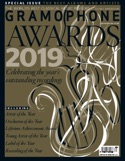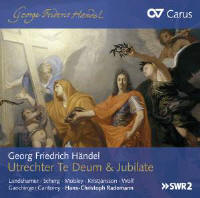Texte paru dans: / Appeared in:
|
|
|
Outil de traduction (Très approximatif) |
|
|
Reviewer:
David Vickers It can be forgotten that Handel’s rapid ascent in London happened during the final years of Queen Anne, the last officially recognised Stuart monarch of Britain. In January 1713 he composed the court ode Eternal source of light divine for her 48th birthday (it is uncertain whether or not it was performed, because of the sovereign’s persistent ill health). At around the same time he also started work on a Te Deum and Jubilate to celebrate the Peace of Utrecht. The treaty marked the end of the bitterly contested pan-European War of Spanish Succession but the postponed thanksgiving service eventually took place at St Paul’s on July 7, 1713. Handel’s involvement caused him to be fired by the Elector of Hanover but by the end of the year he was amply rewarded by Queen Anne with an annual royal pension of £200 for life. This live concert recording by HansChristoph Rademann and the combined ensembles of the Internationale Bachakademie Stuttgart (now known under the collective name Gaechinger Cantorey) presents both of Handel’s major ‘Queen Anne’ works, preceded by some (not all) of the overture-suite from Il pastor fido (1712). A good number of violas, cellos and two double basses give depth of texture to the music but the sturdiness of phrasing is low on dance-like inflections and devoid of any whiff of the theatre. The opening of the birthday ode is quicker than usual; Reginald Mobley’s tuning wobbles unsteadily and a few audible snatched breaths disrupt the mood (happily, the countertenor is on good form elsewhere). The 33-strong choir is too weighty for the modest choral refrains and renders Handel’s emulation of Restoration court odes with misplaced pomposity and heavy-handed grandeur. Full-bodied resonance works to better advantage in the Utrecht Te Deum and Jubilate. Rademann’s reliable pacing and diligent moulding of phrasing are highly effective, and there is a communicative sense of dramatic weighting, and well-judged contrasts between capable verse solos and full choral passages. Assigning the start of the Jubilate to countertenor rather than high tenor is questionable but the choral climax trips along with playful splendour. Overall, the Utrecht canticles receive a much better collective performance than the ode does. Even so, their overtly Purcellian nature is only seldom glimpsed – whereas this essential attribute is abundant in several excellent alternative interpretations. |
|




